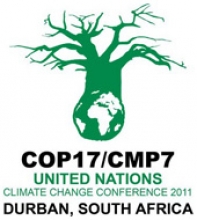Public Services International at COP17

The city of Durban is hosting the annual UN Conference of the Parties negotiations under the UN Framework Convention on Climate Change. Thousands of government delegates from all corners of the planet have turned up once again to see whether agreements can be reached. Durban’s International Conference Center, the location of PSI’s 2012 Congress, is teeming with countless formal meetings, side events and closed sessions. Yet, few believe that the Durban climate summit will produce the necessary results. In fact, most people are just hoping to preserve the gains of the previous years, mainly an extension of the Kyoto Protocol, due to expire in 2012.
Meanwhile, on top of a hill overlooking the city of Durban, thousands of civil society activists have overtaken the campus of the University of KwaZulu-Natal (students are on summer break). Hundreds of conferences and seminars deal with the plethora of issues at stake : land grabs and privatization of wind and sun by corporate energy giants; threats to farmers and fisherfolk, including with mono-crops and industrial farming; the threats from big oil, big coal, big nuke, etc. Africa’s Rural Women have a six –day summit of their own, replete with spontaneous outbursts of resistance songs and dances and seminars for mobilization and activism.
The labour movement has eight days of trainings and seminars, with the mornings dedicated to local area shop stewards, explaining the basics of climate change, the dynamics of the UN negotiations and discussions on implications for specific sectors. PSI hosted Public Services Day on 2 December, with many shop stewards, as well as speakers from Korea, South Africa, Nicaragua, and the Philippines. Although we touched on a range of issues for public service workers, we focused most heavily on the implications of impending climate disasters for health, municipal, water and energy workers.
On 3 December, trade unions and social activists marched through Durban to protest the corporate-induced paralysis of governments and to denounce the lack of binding, enforceable and aggressive targets. PSI is also concerned about the design of the Global Climate Fund, destined to reach $100 billion/year by 2020. It appears as if private corporations will be able to directly access those funds. We remain concerned by increasing marketisation and commodification of carbon and natural resources which is likely to lead to massive financial manipulations and huge profits for the 1%.
Along with ITUC, we advocate Just Transition mechanisms for workers affected by climate change, new financing mechanisms, including the Financial Transactions Tax to fund needed public services and curb speculation, and the adoption of the Social Protection Floor which will guarantee all people access to the basic services needed for life. We are also suggesting a greater role for municipal governments and communities in the ownership and management of renewable energy systems, closer to the people and responsive to their political will.

